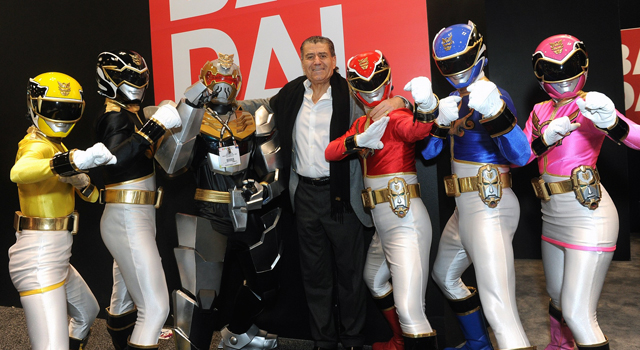
An Israeli filmmaker uncovers his family’s surprising past, hidden deep in his grandmother’s “flat”
By Cindy Mindell
While cleaning out his grandmother’s apartment in Tel Aviv, Arnon Goldfinger discovered overwhelming revelations of his grandparents’ close and protracted relationship with a high-ranking Nazi official. The resulting documentary, released in 2011, is a moving family portrait and an insightful look at the way different generations deal with the memory of the Holocaust.
Hailed as “one of the best Israeli documentaries ever made, ”The Flat” has been screened at film festivals in Israel, Europe, and North America and has received several awards in the U.S. and Germany.
Goldfinger will talk about his work at a community-wide Yom HaShoah commemoration on Wednesday, April 15 at Congregation Beth El in Fairfield, in conversation with Israeli-born playwright and historian Doron Ben-Atar.
He spoke with the Ledger about the journey behind the making of The Flat.
Q: How did you happen to have your camera in your grandmother’s apartment when this extraordinary discovery was made?
A: The evolution of this film is very interesting. My grandmother passed away and one month later, my mother called me and my siblings and my cousins to come to the apartment to think about what to do with everything. By instinct, I just grabbed my camera and came to shoot the happenings. The idea behind it was to just film this place before it vanished because I had been visiting the apartment from as far back as I can remember, and it had its own atmosphere, like a place that does not exist anymore and will vanish. So I had this instinct to film it for the family archives. I just had my personal equipment with me and filmed step-by-step. After one month of doing it, I understood that there is the possibility of making a film out of it.
But the film became something completely different. I had some ideas about what to do with the material I was collecting, based on the premise that you can learn a lot about people from the stuff they left behind. I was going to make a very short film. I felt that, if it won’t be a film, it will be very important material for the family and for the generation to come. But it slowly turned into something different.
Q: In the film, you discover that your grandparents escorted SS officer Leopold von Mildenstein and his wife on a tour of Palestine, where your grandparents had immigrated. How do you explain their relationship?
A: The first meeting between them was in relation to this journey they made in September 1933. At that time, von Mildenstein was a quite well known journalist who wrote travelogues. He was already a member of the Nazi Party and an SS member. My grandfather was one of the main activists in the Zionist movement in Berlin. So that was the link between the two men, a professional relationship. But what I found out was that, through this journey together, the relationship became a personal friendship. For me, the relationship has many very contradictory lines and is full of ambiguities because, on one hand, von Mildenstein was a Nazi and my grandparents were Jews, but on the other hand, they all were Germans. I tried to look at this with as fresh a perspective as I can have.
Today, we have such a strong, black-and-white perspective on what happened during that period. We are now looking at this time through the perspective of the horrible things and big tragedy that happened. Of course, it’s very clear where the line is between the Jews and the Nazis. But, taking into consideration that those people at that time didn’t know what was going to happen – maybe they could guess and maybe not – I think that those people who lived during those years couldn’t predict what would happen and there were many gray zones.
What I found through my research – and it is a little bit different from the common understanding of the period – is that, in 1933, according to many historians, the Nazis were less occupied with the Jews than we believe, at least what I believe. At that time, the SS didn’t have any clear ideology. It is true that Hitler, in Mein Kampf, had already claimed to be against the Jews. But it was not as strong and structured as later on. Before Hitler came to power, many Jews in Germany were in very strong positions in society. It was very different from the Jews in Russia or Poland, who lived in their own villages and communities. The Jews in Germany were regular citizens. My grandfather was a traffic court judge, judging German citizens, and it doesn’t matter that he was a Jew.
In 1933, when the Zionists in Germany heard that this journalist is going to go to Palestine in order to write about Palestine from a Zionist point of view like my grandfather’s, it was very important to push the idea of the Zionist nation as a solution to the “Jewish problem.” It’s very surreal, if you look at it from the perspective of the present. But if you look at it from that time, it’s of course bizarre, but it’s possible to say that the Zionists and some of the Nazis shared the same idea: to move the Jews out of Germany – of course, not by the same means. If you look at the articles by von Mildenstein, the Jew who appears in Palestine is a different Jew. It’s not a weak Jew – so you already can sense some antisemitic hints in his article – he’s writing about the “new Jew;” the Zionist, the pioneer, the one who conquered a new land, who has strength and power.
The von Mildensteins and my grandparents went together on a tour of Palestine for two months; they drove through the country and von Mildenstein wrote a series of articles in a very radical newspaper, Der Angriff, “The Attack,” the official newspaper of Goebbels.
When you think about it, why would Jews care about the writings in this kind of newspaper? I don’t think any Jew would read it. But maybe they could use it for a little PR for the Zionist idea. It’s strange, but that’s what I found out.
Q: Your grandmother’s mother, Susana Lehmann, was deported from Berlin to Theresienstadt in 1942 and murdered. Why did your grandparents keep the friendship after the war and return to Germany to visit the von Mildensteins?
A: I think this is the main turning point in my discovery. Because, until the moment I found out that they kept the relationship, it was much easier to solve the puzzle, to understand this strange relationship before the war, before everybody understood what had happened. But to keep the relationship after the war – that was a big shock for me and very tough to understand. So that was one of my tasks.
There are a few explanations. One thing I sensed throughout my life but became very sure about, is that I don’t see my grandparents as Israelis. My grandmother lived in Israel for 70 years; when she left Germany, she was 28 years old. But she was not an Israeli who was born in Germany. The one thing that became very clear was that she was a German who lived in Israel. I think that’s a very crucial point in order to understand this whole mystery. My grandparents and many other German Jews of their generation were Zionists; but, in many respects, they lived in Israel in exile. They couldn’t mix with the new Middle Eastern Israeli culture. They didn’t use the language so much. They couldn’t go to theater or read the local literature or newspapers – and most of the German Jews were very cultural people. They could only go to the Palestine Symphony Orchestra; that’s where they felt at home; and they kept longing for their motherland. The German Jews were very patriotic to the German nation. My grandfather fought for four years in the First World War and got two Iron Crosses.
For my grandparents, what happened in Germany was an almost incomprehensible shock. I don’t think they could really process or digest it. On one hand, there’s no doubt that they knew the facts but, on the other hand, they had to somehow find a psychological way to justify visiting the von Mildesteins in Germany after the war. I think for them the relationship with the von Mildensteins could play in this way: “Here we are again. We’re Jews, they’re Germans, not all of the Germans were so bad – maybe not all of the Nazis were so bad.” Of course, it’s a play of denial. The main psychological issue in the film is a search for this denial mechanism in all kinds of territories and characters.
Q: In making the film, you traveled to Germany to speak with the von Mildensteins’ daughter and others. What did you expect from the second and third generations of Germans?
A: The one thing I found to be true in the making of the film is how much time I didn’t dare to ask questions about obvious things in my family. The journey I take during the film is the journey to find the courage to ask questions that might get uneasy answers. This decision is in contradiction to other figures in the film, like my mother and Edda [the von Mildensteins’ daughter].
One of the questions I raise by making the film is: Is it important at all to examine the past and ask questions in regard to the past? By making the film, my answer is very clear: I think it’s crucial for a person, in order to understand his life or his being or his present, to have a look back at what he came from – his own past, his family’s past, and his nation’s past. If you try only to look forward or to put those things aside – like characters in the film say, including my mother – that something will always come back to you and sometimes you can’t even find out what it is.
While making the film, I found out that some crucial questions were not asked, and that it’s not just the questions, but the feelings behind those questions. There are some hidden in my family that were carried from generation to generation without our even understanding where this silence was coming from. If I didn’t ask those questions, that silence would be handed down to my kids and they wouldn’t even have the chance to understand where it came from. I think that my generation is the last link because we’re still very close to the people who were victims. I’m not so expert at the German side; I’m looking more at the Israeli side, the Jewish side, my personal and family side – which is a whole mess by itself.
Q: You also learn for the first time about the fate of Susanna Lehmann, your maternal great-grandmother. How did that affect the story?
A: When I was entering the flat with my camera, if you had told me that in a few years I would find my great-grandmother, I wouldn’t have believed it.
For me, Susanna Lehmann is the most emotional character in the film. My siblings and I were born and raised in Israel under the impression that we have no connection to the Shoah. Of course we knew that our family was from Germany, but in our minds we had no connection to the Holocaust. So, this was a big shock for me.
So, while being in Germany and seeing suddenly in a very popular Berlin daily newspaper, there is an article about Susanna Lehmann with her photo, it was crazy. It was almost like taking her out of the grave, which of course she doesn’t have. She’s one of those Jews whom nobody knows what happened to them. There are many Jews like that who were just killed and there’s no memorial, nothing.
In the film, my mother says that she knew that her grandmother, through the family stories, was in Palestine, and somehow she remembered the visit. For me, it was clear – and my mother says it in the film – that my mother knew her grandmother was there in 1937 and decided to go back to Berlin. But for all those years, she believed that her grandmother was old and passed away and that’s it.
This is a big question floating around in the film: how could it be that she never asked her parents about it? This is one of the things that the film depicts: the silent connection inside those families, like my family, was so strong that children understood without the parents saying it that there are some questions you do not dare to ask, because either the answer would be too painful or people probably won’t give you an answer. In the family, there are many messages that parents, especially, deliver to their children without even voicing them. I don’t imagine my mother asked my grandparents about it and my grandmother said, “Don’t ask about it.” She understood without even asking; that’s the power of denying or hiding things.
Q: There are many scenes in the film that include flowers. You bring bouquets to interview subjects and we later see the flowers in a vase. Is there any special symbolism behind the flowers?
A: They represent the good manners of everybody in the film. As I see the relations and behavior of this kind of “yekke” and German culture, I think there is first of all the need to have manners. The whole cultural life of the Germans and the German Jews was built on the Bildung – good manners and being an educated person. Of course, there’s an unbelievable contrast between this Bildung and what happened in Germany.
When I decided to go to Edda in one of the last scenes, there were flowers, and then in the last scene, my mother and I go with flowers and look for the grave of my great-grandfather. Then the flowers disappear. Somehow, a good-mannered yekke boy would keep his good manners till the end, and I don’t think I keep my good manners till the end. I somehow fight against my good manners in order to search for the truth. Flowers kind of represent those good manners, staying polite, where you don’t go into unknown territory or a gray zone.
Community-wide Yom HaShoah commemoration featuring “The Flat” filmmaker Arnon Goldfinger, in conversation with historian and playwright Doron Ben-Atar: Wednesday, April 15, 7 p.m., Congregation Beth El, 1200 Fairfield Woods Road, Fairfield. For information: (203) 374-5544, www.congbethel.net.
CAP: Arnon Goldfinger and his mother, Hannah, search for her grandfather’s grave in Germany, in a scene from The Flat.







 Southern New England Jewish Ledger
Southern New England Jewish Ledger















